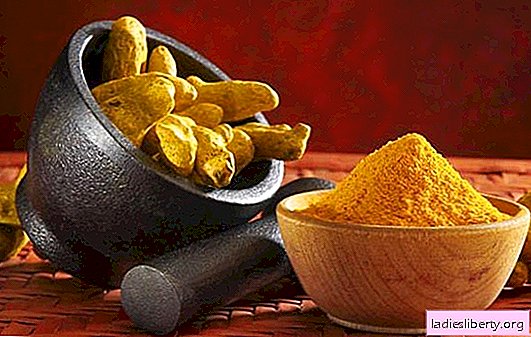
Turmeric (turmeric) is a herbaceous medicinal plant, a spice belonging to the ginger family.
This oilseed culture has found wide application in traditional medicine, diet food, cosmetology, food industry.
In the processing is the yellow-orange rhizome of the plant, which is a natural natural dye.
Calorie content and composition of turmeric
The energy value (caloric content) of this savory sunny yellow spice, which serves as a seasoning for dishes from meat, vegetables, fish, sauces, rice, mashed soups and other products, is 354 kcal / 100 grams. It consists of substances that are beneficial for the body:
• The most important macronutrients and trace elements - zinc, copper, phosphorus, iron, magnesium, selenium, potassium, calcium;
• Vitamins of groups B1, B2, B3, C, E, PP.
Turmeric serves only as a seasoning for dishes, they are added to food in very small doses, therefore both vitamins and valuable macro- and microelements are ingested in meager doses. But there are other ingredients that are included in a minimum amount of turmeric, but they have health benefits.
These are essential oils and constituents - curcumin, patient alcohols, borneol, etc. B
Most of all, curcumin, a natural dye with a pleasant yellow color, deserves attention for its beneficial properties.
That it has anti-tumor features, lowers cholesterol, has anti-inflammatory effect, prevents the formation of amyloid protein.
Turmeric: Benefits for the Body and Health
For the first time, the inhabitants of India began to use turmeric more than two and a half thousand years ago, but this miracle of plant origin has not lost its popularity even today.
The beneficial effect of turmeric on the entire body as a whole and on individual organs and systems has been proven for preventive and therapeutic purposes.
• Prevention of cancer (lung and breast cancer, melanoma, leukemia); slowing the formation of metastases in diagnosed diseases;
• Mix in equal proportions with salt (0.5 tsp each) dissolved in a glass of warm water - a means to help the throat in case of sore throat; ARVI relieves the symptoms of tea or warm milk with a pinch of spice;
• Thanks to the curcumin, which is part of the spice, normal brain function, preventing the development of Alzheimer's disease. The number of people suffering from this incurable disease is constantly increasing. The risk of developing dementia is reduced by the constant use of turmeric, its benefits in preventing the disease;
• In case of skin diseases (psoriasis, furunculosis, eczema) in the period of exacerbation - wound healing accelerates;
• Beneficial effect on the state of the intestinal flora, on the digestive organs and liver, is an antiseptic, antioxidant and sorbent. Helps with increased gas and bloating;
• The ability to remove toxins from the body in case of poisoning (including chemical) has found the use of turmeric as an absorbent;
• It is used in the treatment of rheumatoid arthritis, gout, arthritis. It has an anti-inflammatory effect, relieves swelling, muffles pronounced pain syndrome;
• Reduces the frequency of headaches, migraine attacks;
• Turmeric cleans the blood and blood vessels, reduces cholesterol in the blood;
• It is a powerful antioxidant created by nature, neutralizing the harmful effects on the human body of free radicals.
Does turmeric harm?
In comparison with the benefits of the harmful effects of turmeric on the health and condition of the body is much less, but still worth considering that there are contraindications for use.
• The use of turmeric during pregnancy is not recommended due to the risk of allergic reactions in both the expectant mother and the child; nursing mothers; children under five years old should also refrain from consuming this spice;
• Nephritis, kidney stones or suspicion of this disease, pancreatitis, hepatitis, gastric ulcer, chronic diseases of the gastrointestinal tract are contraindications for which turmeric can aggravate the course of the disease and harm health;
• The simultaneous use of drugs and drugs along with turmeric can lead to an unfavorable outcome in the treatment of diseases;
• The tonic effect creates problems with going to bed (falling asleep) when taken in the evening.
Turmeric product is more useful than harmful, if you know the measure and do not exceed the dosage of 3-5 grams in the daily diet, as well as knowing the contraindications and the state of your health.
Turmeric in the children's diet: harm or benefit?
Introduce spices in baby food should be gradually, as many of them can cause allergic reactions. Gradually adding spices to food will help facilitate the identification of the allergen and its further exclusion from the baby’s daily diet.
Turmeric is a spice that can bring, when consumed in small doses, significant benefits in the formation of a child’s immunity, to improve the bowels and stomach, to prevent childhood leukemia. Parents seeking to minimize the consumption of medicines by their favorite child can find some recipes that include turmeric:
• For pharyngitis - mix half a teaspoon of turmeric powder with 1 teaspoon of honey and dissolve 2-4 times a day. Relief doesn't keep you waiting.
• Bleeding and weak gums are often found in children. The solution for rinsing from a glass of warm water with the addition of half a tablespoon of turmeric will help.
• When cuts, turmeric powder helps to quickly stop the blood, with burns it helps to heal wounds as soon as possible (it should be mixed in equal doses with aloe juice and applied to sore spots).
• Helps to solve the problem of youthful acne gum from turmeric with the addition of water.
Turmeric in a diet losing weight, its benefits and harm
Turmeric is used to prevent diabetes and obesity, normalizes metabolism, is part of the diet and drink.
Should turmeric be consumed if prophylaxis is already late and there is one of the main problems of both male, female and child obesity or the presence of excess weight? Let's try to understand this issue.
Turmeric has a similar structure to the popular and widely known ginger, which is used to reduce weight in people who want to lose weight. Curcumin reduces the formation of fat in the tissues and reduces cravings for sweet and fatty foods, which greatly facilitates the difficult and long process of losing weight. All weight loss recipes should be treated with caution to people suffering from gallstone disease or other illnesses associated with the work of the gallbladder, as well as prone to allergic reactions. It is advisable to consult a doctor even those who consider themselves healthy. If you still decide to try on yourself any new or long-known diet - be sure to pay attention to any changes in their state of health.
Overuse of turmeric and overdose can lead to a feeling of bitterness in the mouth, heartburn, exacerbation of diseases (gallstone disease, cholecystitis, gastritis, pancreatitis, etc.). In the event of anxiety symptoms, seek immediate medical attention.
Useful slimming recipes with turmeric
In order for turmeric to reveal all its beneficial properties for losing weight, it is used in the daily preparation of drinks, first and second courses, or in special recipes that we present in this article. You should not worry about the calorie content of turmeric, its content in recipes is very insignificant. When using spices in the daily nutritious diet, miracles, of course, will not happen, but you can try.
1. Smoothies with turmeric, spinach and cucumber
Grind in a blender a handful of spinach, 150-200 grams of cucumber, a little green (dill, parsley, cilantro). Add a pinch of turmeric into the mixture, 2 tbsp. l natural yoghurt and 0.5 tsp fresh lemon juice.
2. Milk-honey drink
For weight loss for two weeks, 2 times a day, we recommend the following drink: 1 glass of warm milk + a pinch of turmeric and red pepper + 1 tsp. honey
3. Kefir drink with ginger and turmeric
In 1 cup of nonfat kefir (or with a fat content of not more than 1%) add 0.5 tsp. ginger and turmeric, mix. Drink between meals.
4. Tea with cinnamon and turmeric for weight loss
In half a liter of boiling water add 4 tbsp. l custard tea, a teaspoon of honey, a pinch of cinnamon and turmeric, a little ginger. Drink tea slightly cooled, once a day (preferably in the morning, as it has a tonic effect).
It is worth noting that turmeric is very good as an auxiliary ingredient in recipes for those seeking to lose weight. But still the basis of weight loss - adherence to diet, limiting the consumption of sweet and fat, physical activity, a healthy lifestyle.
Turmeric, which has a slightly burning taste and spicy aroma, has a large number of admirers among gourmets and connoisseurs of traditional recipes for preparing various dishes. But, as it turned out from this article, it has both useful properties and those that can be harmful to health. Whether to use turmeric as a food additive can be solved only individually, relying on your taste and taking into account the state of health of your own organism.











